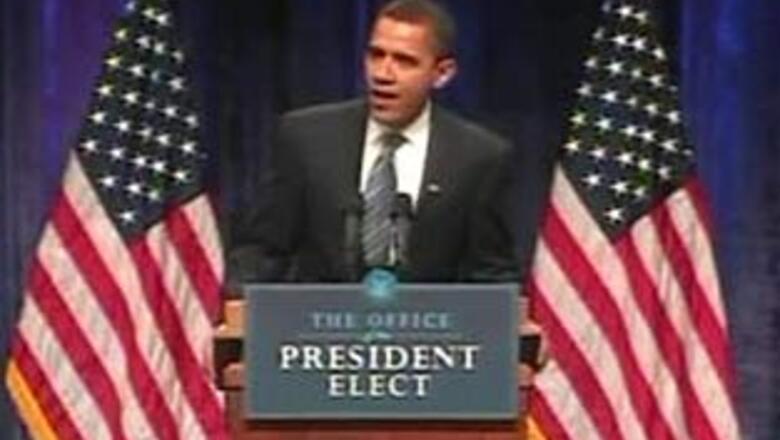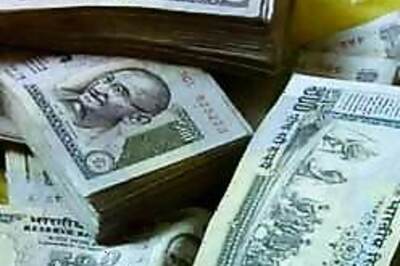
views
Washington: President Barack Obama called AIG reckless and greedy on Monday during a blistering attack in which he pledged to try to block the insurance giant from handing its executives $165 mn in bonuses after taking billions in federal aid.
Obama on Monday joined other officials in criticizing American International Group, the company that has fast become the symbol for the ways in which America's federal bailouts have gone awry.
A public backlash against Washington over the bonuses would make it tougher for Obama to ask Congress for more bailout help - and jeopardize other parts of the recovery agenda that has dominated the early weeks of his presidency.
With that in mind, the president and his top aides were working hard to distance themselves from the insurer's conduct, to contain possible political damage and to try to bolster public confidence in his administration's handling of the broader economic rescue effort.
"How do they justify this outrage to the taxpayers who are keeping the company afloat?" Obama asked. "This isn't just a matter of dollars and cents. It's about our fundamental values."
Bailout steps for AIG totaling over $170 bn since September have effectively left the federal government with an 80 percent stake in the faltering insurance giant.
David Axelrod, senior adviser to Obama, said in an interview that there was no question that the bonuses and the public's anger over them could derail administration efforts to right the economy.
"People are angry because they've seen exhibit after exhibit of irresponsibility and people walking away with money in their pockets," he said. "It's undermined the discussion that we have to have."
Obama had scheduled a speech Monday to announce new help for recession-pounded small businesses, but first used the occasion to tear into AIG.
"This is a corporation that finds itself in financial distress due to recklessness and greed," Obama declared.
He said he had directed Treasury Secretary Timothy Geithner to "pursue every legal avenue to block these bonuses and make the American taxpayer whole."
Later, White House spokesman Robert Gibbs said the administration would modify the terms of a pending $30 bn bailout installment for AIG to at least recoup the $165 mn the bonuses represent. That wouldn't rescind the bonuses, just require AIG to account for them differently.
Axelrod called the bonuses "spectacularly tone-deaf."
He said the administration hoped the tough talk would result in voluntary action on the part of AIG and its bonus recipients, although that remains an open question. "All we can do is administer this thing going forward," he said.
In a letter to Geithner over the weekend, the government-appointed chief executive of AIG, Edward Liddy, said the bonuses were legally binding obligations and the firm's "hands are tied."
On a separate track, New York Attorney General Andrew Cuomo said on Monday he would issue subpoenas for information on the bonuses after AIG missed his deadline for providing details. Cuomo said his office would investigate whether the employees were involved in AIG's near-collapse and whether the $165 mn in bonus payments were fraudulent under state law.
AIG spokeswoman Christina Pretto said, "We are in contact with the attorney general and will of course respond to his request."
Obama's comments came on the same day a new poll showed slippage in his approval rating. The poll by the Pew Research Center showed it dropped from 64 percent in February to 59 per cent this month amid differing opinions over his economic proposals and what the pollsters said was a growing perception that the president is listening more to his party's liberals than to its moderates.
Still, those surveyed generally gave the president favorable marks for doing as much as he can to try to fix the economy, and few blame him for making the economy worse.
Andrew Kohut, Pew's director, said in an interview that people are most angry with banks and companies but there's also "pushback against Washington generally. And, of course, the buck stops with Barack Obama these days."
Obama's sharp words continued an insistent administration drumbeat over the past few days designed to pressure the bonus recipients to forgo them. Pressure was building on that issue - and on the government to rework its AIG bailout to make sure the company repays as much of the $170 bn as possible.
So far, the company has been honoring its contracts with US and foreign banks, paying out more than $90 bn in economic bailout funds to big banks and others. The government agreed to uphold those contracts when it seized control of AIG in September, contending that failure would bring even worse global economic problems.
However, Obama officials made the rounds of Sunday talk shows to denounce the insurer. And even Federal Reserve Chairman Ben Bernanke weighed in, saying on CBS' "60 Minutes" that the AIG bailout angered him the most and that he "slammed the phone more than a few times on discussing AIG." Still, he said a collapse of AIG would have wreaked havoc on the global economy.
Obama was planning an appearance later in the week on Jay Leno's NBC talk show, perhaps to add a lighter touch to his efforts to show himself in command of efforts to resuscitate the economy.
The AIG bonuses were revealed over the weekend. It also was disclosed that AIG used $90 billion-plus in federal aid to pay foreign and domestic banks, some of which had received their own multibillion-dollar U.S. government bailouts.
The recipients included Goldman Sachs, at $12.9 bn, and three European banks — France's Societe Generale at $11.9 bn, Germany's Deutsche Bank at $11.8 billion, and Britain's Barclays PLC at $8.5 bn. Merrill Lynch, which also is undergoing federal scrutiny of its bonus plans and which is now part of Bank of America, had received $6.8 bn as of December 31.
The money went to banks to cover their losses on complex mortgage investments, as well as for collateral needed for other transactions.
Obama, keenly aware of the country's bailout fatigue, also freed billions of dollars to help America's small businesses. The centerpiece of his plan will allow the government to spend up to $15 bn to buy the small-business loans that are now choking community banks and lenders. That, in turn, could allow those banks to start lending money again to small companies to invest, pay bills and stay afloat.
Small businesses have created about 70 percent of the new jobs over the past decade, and as their credit lines have dried up, so has their ability to thrive or survive.



















Comments
0 comment